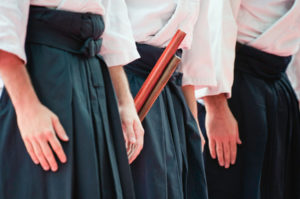The emotional lives of teens are more complex than we know. Feelings of restlessness and anger often overwhelm kids in these pivotal years. High school students generally have trouble thinking before they act – their brains are more impulsive than those of adults – and if they suffer from ADHD or learning disabilities, this can be doubly so.
Over the summer, parents sometimes despair at the way their teens stare sullenly at their phones, or worse, seek out trouble with their friends.
If you have a teenager still mastering emotions and self-control, and you’re at a loss, consider martial arts to keep them occupied in a healthy way. Your teen can benefit from the discipline and emotional connection that comes through the practice of aikido.
Aikido for Teens Provides Physical, Mental, and Emotional Benefits
Aikido is unique among the martial arts because of its focus on philosophy and emotional connection. As he practices, your teen can both channel any aggression he feels and learn to control his emotions as he learns to control his movements.
-
Physical Benefits
Aikido keeps the body moving, promoting both strength training and cardio. Your teen may even lose weight through regular practice.
-
Mental and Emotional Benefits
Through aikido, young people learn to use their mind as a tool for problem solving. They practice discipline, self-control, and respect for both their sensei and their partners. Ultimately, this practice is self-empowering, giving young people more confidence.
-
Social and Spiritual Benefits
As a philosophy rather than simply an exercise program, aikido helps teens move beyond a me-vs.-the world mentality. Using “no loser” games,” aikido teaches teamwork and cooperation. For teens dealing with negative thoughts or bullying, this practice could be life-changing.
Promote Non-Violence and Positivity with the Philosophical Martial Art of Aikido
It’s natural to question the benefits listed above. After all, aren’t the martial arts rather violent? Will your teen simply learn a new way to fight? Actually, aikido does quite the opposite. As an art form rooted in self-defense, aikido is not designed for malicious intent. Through regular practice, teens develop the patience and peace of mind that help them tame out-of-control emotions and learn self-awareness.
Think about it this way: Teens who respond with aggression often do so because their emotions overwhelm them and they have taken their brain out of the equation. But the study of martial arts, like aikido, promotes emotional stability as it trains students to use controlled movements and treat instructors and partners with respect. This training helps teens explore other ways to control outbursts and manage conflict.
Respectful teens who have a measure of self-awareness are more likely to think before they act, and less likely to “act out.” With its emphasis on harmony, aikido is particularly well-suited to calm a teen’s restless mind and raging emotions.
Visit Shin-Gane to Learn More about how Aikido can Help Your Teen
At Shin-Gane we welcome kids as young as 13. We hold classes every Tuesday and Wednesday evening, and we’d love to meet your teen and allow him or her to try out the peaceful, disciplined philosophy of aikido.


Leave a Comment